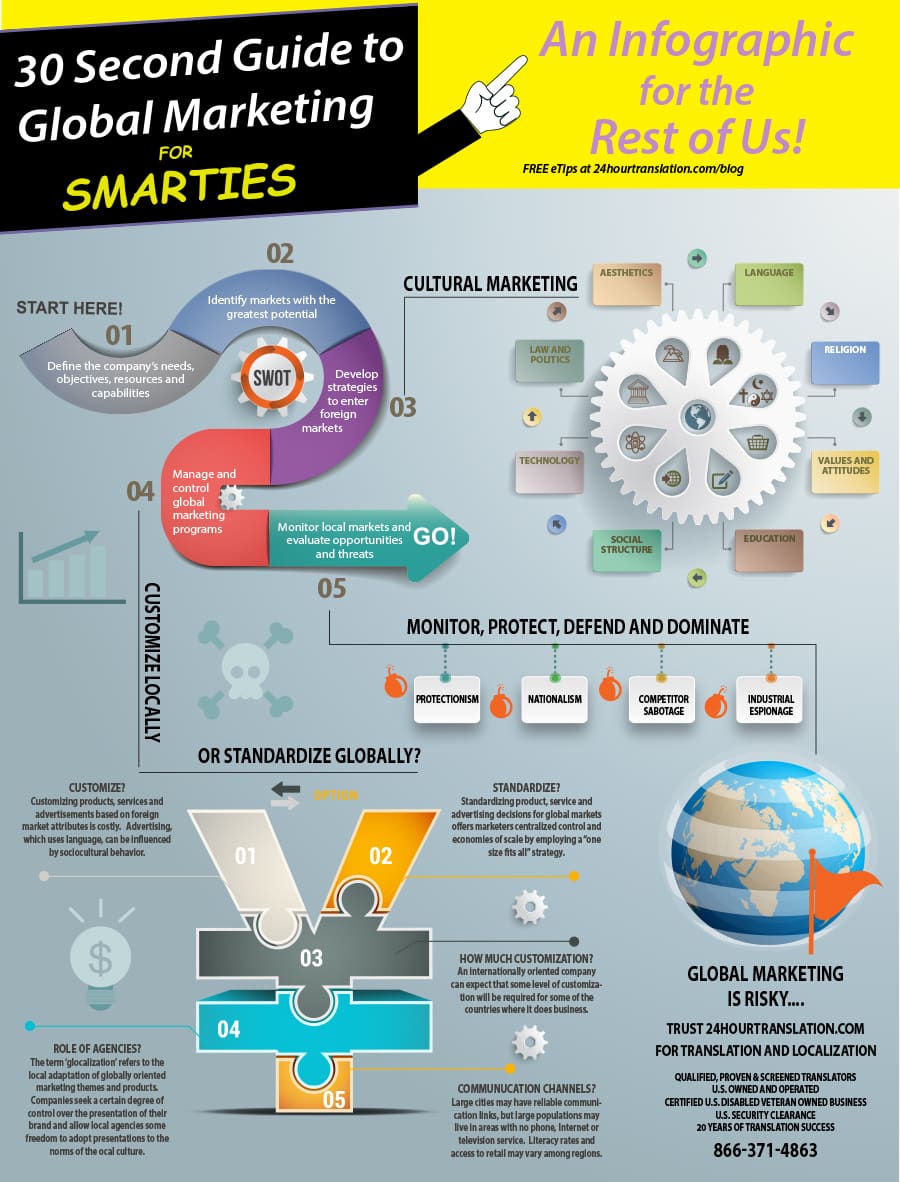The Power of International Advertising
International advertising plays a critical role in creating brand recognition for many companies, both big and small. Emerging brands like Airbnb, Uber, Spotify, and Zoom have successfully utilized global marketing strategies to gain international recognition and success. Although advertising isn’t solely responsible for the success of these brands, it has played a significant role in increasing brand awareness and conveying the values and personality of the brand. The power of advertising and promotion is a critical component for conveying a brand’s presence, personality, status, and prestige.
Efficient and Effective Global Brand Marketing
Businesses seeking to market internationally must invest in efficient and effective brand marketing initiatives that cross geographic and cultural boundaries. This practice generally relies heavily on language translation services and involves standardizing advertising and promotional activities, which also provides companies with increased control. By controlling and centralizing advertising, businesses can more efficiently direct the work needed of local agencies to ensure that the brand image is communicated consistently internationally.
Does Cultural Segmentation Make Sense?
We’ve prepared the following questions to help you identify whether cultural segmentation makes sense for your brand, what the benefits and disadvantages are, and whether a modified marketing mix and promotional mix are required.

Why Market Internationally?
There are many reasons why companies market internationally. Some companies outgrow their domestic markets and must enter international markets to meet the growth demands required by stockholders. Other companies react to competitors that have entered foreign markets by entering the same markets to develop and protect their competitive position. Ease of entry into foreign markets is also a key driver for businesses looking to expand internationally. These businesses usually have evaluated the ease of transferring technology, the costs of manufacturing, the wealth of the country, distribution channels, logistics and infrastructure, and cultural and economic factors that, when considered as a whole, offer promising opportunities. Marketers are also concerned about the access to and cost of available media and promotional channels. Yet another reason attractive to marketers is exploiting widespread international knowledge of their brands and products, specifically products that have gained international exposure through international sporting events, satellite television, cinema, and social media. Thus, consumers throughout the world may already have awareness and demand for certain products even though the products are currently not available in their country.
Does culture influence purchase decisions?

Maybe yes and maybe no. The real question is how much and in what ways. With the widespread acceptance and use of social media, satellite television, and other platforms, some experts hypothesize that cultures are converging and becoming increasingly homogeneous. Emerging brands like Airbnb, Uber, Spotify, and Zoom have successfully leveraged these platforms to build a global following. However, we also experience cultures holding onto strong beliefs and practices. For instance, certain markets may have different preferences in terms of product design and packaging, which can impact a brand’s success.
How Does Culture Influence Purchasing Decisions?
Marketers should be sensitive to how verbal and nonverbal expressions, brand names, and packaging can be interpreted among different cultures. Emerging brands like Airbnb and Uber have adapted their services and brand messaging to local cultures to appeal to a global audience. This involves not only translating content but also adapting it to local customs and practices. Additionally, marketers must ensure that high-quality translations are used in advertising and respect local dialects. The international marketing world is awash with stories of brand names, packaging designs, or ads that failed because they were interpreted to mean something inappropriate or outrageous in some regions.

What type of promotion is most effective for a given culture?
Marketers need to evaluate the effectiveness of their promotional offers and advertising messages to targeted foreign cultures and establish the cultural prerequisites needed to be successful. Emerging brands like Spotify and Zoom have successfully used cultural insights to craft their global marketing strategies. For example, Zoom’s marketing campaigns in Japan featured images of a famous comedian to emphasize the platform’s ability to bring people together and create a sense of community. Similarly, Spotify has used localized marketing strategies to connect with listeners in various countries, such as its “Equal” campaign in India which aimed to promote gender equality and diversity through music. In order to achieve successful global marketing campaigns, it is crucial for companies to understand the cultural differences and nuances of the regions they are targeting, and tailor their promotional efforts accordingly.
Airbnb
Creating engaging and shareable content has been an essential part of Airbnb’s global marketing strategy. In 2015, the company launched its “Belong Anywhere” campaign, which featured user-generated content showing travelers experiencing unique and authentic stays through Airbnb. The campaign showcased Airbnb’s ability to provide travelers with one-of-a-kind experiences, while also fostering a sense of community among its users. The company has also utilized social media to connect with its users and promote its brand through various initiatives, such as its #OneLessStranger campaign, which encouraged users to perform random acts of kindness for strangers and share their experiences on social media.
Uber
Uber, another emerging brand that has gained significant international recognition, has utilized a hyperlocal marketing strategy to expand its business globally. By tailoring its marketing efforts to specific regions and cities, Uber has been able to effectively market its services to local consumers. For example, in India, the company created a campaign called “Apnapan” (which means “our own”) that highlighted the benefits of Uber for both riders and drivers. In addition, Uber has also launched marketing campaigns that focus on the cultural relevance of its service, such as its “Scooternama” campaign in India, which highlighted the role that two-wheelers play in Indian culture and how Uber’s two-wheeler service can help riders navigate crowded streets.
Spotify
Spotify, a music streaming platform, has utilized a data-driven marketing approach to expand its user base globally. The company has analyzed user data to create targeted and personalized campaigns, such as its “Year in Music” campaign, which provides users with personalized insights into their listening habits over the past year. In addition, Spotify has also created region-specific campaigns, such as its “Discover India” campaign, which highlighted local music and artists to Indian users.
Zoom
Zoom, a video conferencing platform that gained significant traction during the COVID-19 pandemic, has also utilized a data-driven approach to expand its global reach. The company has utilized customer feedback and user data to improve its service and create targeted marketing campaigns. For example, the company launched a marketing campaign that targeted specific industries and highlighted the benefits of its service for remote work, such as its “Zoom for Home” campaign, which targeted remote workers and highlighted the benefits of using Zoom for virtual meetings and collaboration.

When does culture influence purchase decisions?
When exposed to the same advertisement or promotional offer, one culture may immediately respond differently from another. For instance, in response to an advertisement for a new energy drink, one culture might make a purchase, another might gather additional research and a third might ignore it completely. These reactions might result from cultures that show a great propensity for health and/or value consciousness or from cultures averse to advertising. One determining factor might include the degree to which a culture is influenced by personal beliefs in comparison to cultural beliefs. For instance, a Middle Eastern culture would be expected to draw on cultural and religious beliefs when forgoing a pork dinner in favor of a halal beef dinner.
How will the message be interpreted?
A culture interprets advertising and forms attitudes based on the social worlds it encounters. When a single advertisement is shown to different cultures, it may be effective or it may be viewed as contrived or unoriginal and then be quickly discounted. How the advertisement is interpreted depends on the context, the receiver and the communication codes that form the cultural expectations of the sender and receiver.
Non-verbal communication is another key element of advertising. Because non-verbal gestures may suggest considerably different meanings from one culture to another, diverse communicative systems among cultures have important implications for international marketing. Thus using national stereotypes in advertising can be effective or disastrous for advertisers. When stereotypes encourage positive and enduring sentiments, they can be effective. Consequently, advertisers must employ only gestures with positive connotations so that meanings reflect well on the brand and eliminate the potential for unintended consequences.
Marketers must also ensure that only high quality translations are used in advertising and respect local dialects. The international marketing world is awash with stories of brand names, packaging designs or ads that failed because they were interpreted to mean something inappropriate or outrageous in some regions because the planners did not think outside their own cultural frame of reference.
What managerial differences exist among cultures?
Cultures can vary widely in the norms followed in introductions, negotiations, gift giving, presentations, service delivery and repertoire. Some cultures observe such strict cultural protocols that businesses must also adhere to the restrictions, limitations and resistance to outside companies. For instance, attaining rights to import products and gaining market acceptance for non-domestic brands can be highly challenging or even impossible in certain countries. This is often the case when cultures have a strongly held belief in building mutually advantageous business relationships cautiously and gradually over extended time periods. Thus, foreign cultures may not be accustomed to or comfortable with offering the instant rapport that Western businesses often expect.
Conclusion
In conclusion, global marketing strategies are essential for businesses looking to expand their reach and connect with consumers around the world. By utilizing data-driven and hyperlocal marketing approaches, as well as creating engaging and shareable content, emerging brands such as Airbnb, Uber, Spotify, and Zoom have been able to successfully market their services to global audiences and gain significant international recognition and success.
International advertising plays a critical role in creating brand recognition for many companies, including Apple, McDonald’s, Nike, Disney and Toyota. Although advertising isn’t solely responsible for the success of these brands, it would be difficult to imagine succeeding without advertising. For many people throughout the world, advertising provides the sole source of information about international brands. The power of advertising and promotion, even to non-target audiences, is a critical component for conveying a brand’s values, presence, personality, status and prestige.
24 Hour Translation Services: Your Partner in Global Marketing
As a leading provider of language translation services, 24 Hour Translation Services is committed to helping businesses effectively communicate with customers around the world. This article on global marketing highlights the importance of language translation in successful international marketing strategies. By accurately translating and localizing advertising and promotional materials, businesses can effectively convey their brand’s values, personality, and prestige to global audiences.
At 24 Hour Translation Services, we offer a wide range of language translation services, including website localization, video subtitling, and document translation. Our team of experienced translators are native speakers with expertise in a variety of industries, ensuring that your message is accurately and effectively conveyed to your target audience. Whether you are seeking to expand your business globally or simply looking to communicate with a diverse customer base, we are here to help. Contact us today to learn more about our services and how we can help you succeed in global marketing.
Frequently Asked Questions
Global marketing plays a crucial role in the success of emerging brands by expanding their reach beyond domestic markets, increasing brand recognition, and facilitating market expansion. By implementing effective global marketing strategies, companies can attract a wider audience, adapt to local preferences, and establish a strong presence in international markets.
International advertising can increase brand recognition by conveying the brand’s values and personality to a global audience. By using consistent messaging and visuals, companies can create a coherent brand image that resonates with consumers across different cultures, ultimately increasing brand awareness and driving customer loyalty.
Cultural segmentation refers to the process of dividing a market based on cultural differences, such as language, values, beliefs, and customs. By considering cultural segmentation, companies can tailor their marketing strategies to address the unique preferences and needs of consumers in different regions, ultimately leading to more effective communication and stronger customer relationships.
Cultural factors can significantly influence purchase decisions, as consumers in different regions may have different preferences, values, and beliefs that affect their buying behavior. Understanding these cultural nuances allows companies to adapt their product offerings and marketing strategies to better appeal to local consumers, increasing the chances of success in international markets.
Promotional offers are a critical aspect of global marketing strategies because they can incentivize consumers to try new products or services, creating an opportunity for companies to gain market share in competitive international markets. By offering culturally relevant promotions, businesses can increase consumer engagement and drive sales growth.
Non-verbal communication plays a significant role in cross-cultural marketing, as gestures, body language, and visual elements can convey different meanings across cultures. By understanding and respecting the non-verbal communication norms of different regions, companies can avoid misunderstandings and ensure that their marketing messages are interpreted as intended.
Efficient and effective global brand marketing can contribute to a company’s success by streamlining and centralizing advertising and promotional activities, ensuring consistent messaging across markets, and allowing for better control over brand image. This approach can also help businesses optimize their marketing budgets, reduce the risk of miscommunication, and enhance overall marketing performance.
When standardizing advertising and promotional activities for international markets, companies should consider factors such as language translation, cultural nuances, local customs, and legal regulations. Adapting marketing materials to meet these requirements can help ensure that brand messaging is consistent and well-received by consumers in different regions.
Understanding the cultural influence on purchasing decisions is crucial for developing effective global marketing strategies. Companies must consider cultural preferences, beliefs, and values when designing products, crafting marketing messages, and selecting promotional tactics to ensure that their offerings resonate with consumers in different markets.
Adapting brand messaging to local cultures is important for international marketing success because it allows companies to connect with consumers on a deeper level, addressing their unique needs, preferences, and expectations. By being sensitive to cultural nuances and tailoring marketing communication to resonate with local audiences, businesses can build stronger relationships with customers, improve brand perception, and ultimately drive sales growth.
A data-driven marketing approach allows companies to make informed decisions based on consumer behavior, preferences, and trends, resulting in more targeted and effective marketing campaigns. By leveraging data insights, companies can optimize their marketing strategies for different regions, personalize their messaging, and tailor their offerings to better appeal to local consumers.
Market expansion can be achieved through global marketing strategies by identifying new markets with growth potential, adapting products and services to meet local preferences, and implementing marketing campaigns that resonate with consumers in different regions. By carefully planning and executing international marketing efforts, companies can increase their market share and boost revenue growth.
Key considerations for international market entry include market research, competitive analysis, cultural adaptation, localization strategies, legal compliance, and logistical considerations. Companies must thoroughly assess these factors to determine the feasibility of entering a new market and to develop a successful market entry strategy.
Localization strategies involve adapting products, services, and marketing materials to the specific preferences, customs, and regulations of a target market. By implementing localization strategies, companies can better connect with local consumers, demonstrate cultural sensitivity, and improve the effectiveness of their global marketing efforts. Localization helps ensure that marketing messages resonate with the target audience and that products and services meet local expectations, ultimately increasing the chances of success in international markets.
Cultural adaptation is the process of adjusting marketing messages, products, and services to align with the unique characteristics of a specific culture. By incorporating cultural adaptation into international marketing campaigns, companies can demonstrate their understanding of and respect for local customs, preferences, and values. This can lead to stronger connections with consumers, increased brand loyalty, and more effective marketing efforts that drive sales and growth in international markets.



Great and detailed post on marketing internationally! Nice point about the non-verbal cues that we have to be careful about.
I went over this site and I conceive you have a lot of great information, saved to favorites (:.